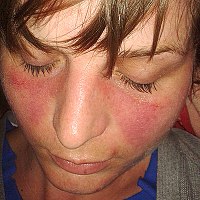
Photo from wikipedia
OBJECTIVES This study elucidated the prognosis and risk factors associated with damage accrual during long-term remission maintenance therapy for patients with antineutrophil cytoplasmic antibody-associated vasculitis (AAV). METHODS We obtained data… Click to show full abstract
OBJECTIVES This study elucidated the prognosis and risk factors associated with damage accrual during long-term remission maintenance therapy for patients with antineutrophil cytoplasmic antibody-associated vasculitis (AAV). METHODS We obtained data from 120 patients registered in a nationwide prospective cohort study on remission induction therapy in Japanese patients with AAV and rapidly progressive glomerulonephritis (RemIT-JAV-RPGN), who achieved remission at 24 months after treatment initiation and were followed up for additional 24 months. The primary outcome was the vasculitis damage index (VDI) score at Month 48, and the secondary outcome included risk factors associated with increased total VDI at Month 48. RESULTS The understudied patients comprised 52 men and 68 women aged 68 ± 13 years. Between Months 25 and 48, the patients' survival rate was 95% (114/120). End-stage renal disease developed in seven patients by Month 48, and 64 cases had increased VDI. The multivariable analysis results revealed that oral prednisolone (PSL) doses at Month 24 were associated with damage accrual between Months 24 and 48. CONCLUSIONS VDI accrual was observed in more than half of patients with AAV during maintenance therapy, and increased VDI scores were associated with oral PSL doses 24 months after initiating remission induction therapy in Japan.
Journal Title: Modern rheumatology
Year Published: 2023
Link to full text (if available)
Share on Social Media: Sign Up to like & get
recommendations!